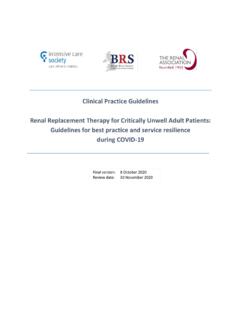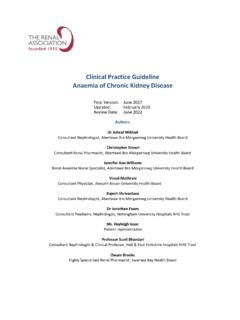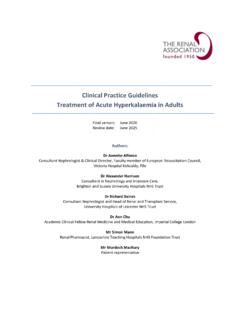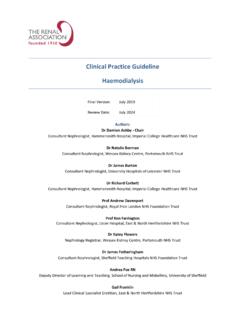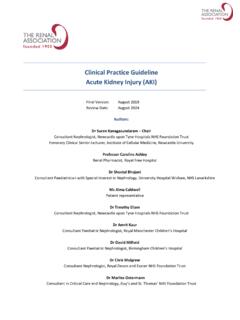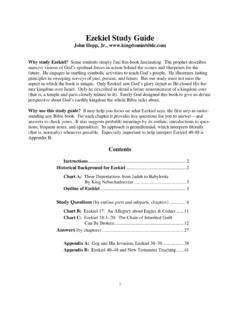Transcription of UKKA guideline: SGLT2i in adults with kidney disease
1 UK kidney Association Clinical Practice Guideline: Sodium-Glucose Co-transporter-2 (SGLT-2) Inhibition in adults with kidney disease Authors: Working Group co-chairs: Assoc. Prof. William G. Herrington & Dr Andrew H. Frankel Working Group members: Dr Alexa Wonnacott, Dr David Webb, Mrs Angela Watt, Mr Michael Watson, Mr John Roberts, Assoc. Prof. Natalie Staplin, Dr Alistair Roddick, Dr Alex Riding, Dr Eirini Lioudaki, Dr Apexa Kuverji, Prof. Mohsen El Kossi, Dr Patrick Holmes, Mr Matt Holloway, Prof. Donald Fraser, Dr Chris Carvalho, Prof. James Burton, Prof. Sunil Bhandari See appendix for list of previous versions/revisions and working group affiliations. Final version: 18 October 2021 Review date: 18 October 2026 UKKA Guideline: SGLT-2i and kidney disease Page 2 Endorsements The National Institute for Health and Care Excellence (NICE) has accredited the process used by The UK kidney Association to produce its Clinical Practice Guidelines.
2 Accreditation is valid for 5 years from January 2017. More information on accreditation can be viewed at Method used to arrive at a recommendation The recommendations for the first draft of this guideline resulted from a collective decision reached by informal discussion by the authors and, whenever necessary, with input from the Chair of the Clinical Practice Guidelines Committee. If no agreement had been reached on the appropriate grading of a recommendation, a vote would have been held and the majority opinion carried. However this was not necessary for this guideline. Conflicts of Interest Statement All authors made declarations of interest in line with the policy in the Association s Clinical Practice Guidelines Development Manual.
3 Further details can be obtained on request from the UK kidney Association. UKKA Guideline: SGLT-2i and kidney disease Page 3 Contents Executive summary .. 4 Summary of recommendations .. 5 List of abbreviations .. 10 Section 1: Background, aims and concise methods .. 12 Section 2: SGLT-2 inhibition and renal protection in people with CKD in the context of type 2 diabetes mellitus .. 28 Section 3: SGLT-2 inhibition and renal protection in people with CKD without diabetes mellitus .. 48 Section 4: Selection of SGLT-2 inhibitors .. 58 Section 5: Prescribing SGLT-2 inhibitors safely .. 63 Section 6: Lay summaries and patient information leaflets .. 88 Section 7: Use in special populations of specific interest .. 104 Appendix I: Systematic literature review design and results.
4 117 Appendix II: Revision history .. 124 Appendix III: Working group membership affiliations .. 125 UKKA Guideline: SGLT2i and kidney disease . Executive Summary Page 4 Executive summary Sodium-glucose co-transporter-2 (SGLT-2) inhibitors were initially developed to treat hyperglycaemia in people with type 2 diabetes mellitus (DM). Results from large placebo-controlled clinical outcome trials have shifted the focus to SGLT-2 inhibition s potential to manage cardio-renal risk rather than hyperglycaemia. In people with type 2 DM at high risk of atherosclerotic cardiovascular disease , SGLT-2 inhibition reduces cardiovascular risk, particularly from heart failure. In people with chronic kidney disease (CKD), the CREDENCE and DAPA-CKD trials have demonstrated SGLT-2 inhibition s particular efficacy at also reducing risk of kidney disease progression in people with type 2 DM and albuminuric diabetic kidney disease .
5 Subgroup analyses from DAPA-CKD also suggest these benefits extend to certain types of albuminuric CKD, irrespective of the presence of diabetes mellitus. The effectiveness of SGLT-2 inhibitors at glucose lowering diminishes as the kidney function falls; however, the relative effects of SGLT-2 inhibition on kidney disease progression and cardiovascular risk appear preserved in people with type 2 DM and CKD, at least within the range of kidney function represented in the reported trials. SGLT-2 inhibition therefore represents a paradigm shift in the management of people with CKD. The aim of these UK kidney Association guidelines is to facilitate rapid and safe use of SGLT-2 inhibitors in the context of CKD. Specifically we aim to: i.
6 Provide guidance on use of SGLT-2 inhibitors in people with CKD, focusing on the potential to modify risk of kidney disease progression; and ii. Support the safe implementation of SGLT-2 inhibitors into clinical practice. We offer evidence-based graded practice guidelines covering the appropriate use of SGLT-2 inhibition in different populations with CKD, accompanied by recommendations for implementation, clinical research and audit, together with template patient information leaflets to facilitate safe prescribing. We also summarize current licensing of different SGLT- 2 inhibitors with respect to kidney disease and cross-reference relevant parts of the 2021 Association of British Clinical Diabetologists - Renal Association (ABCD-RA) Clinical Practice Guidelines for the Management of Hyperglycaemia in adults with Diabetic kidney disease .
7 At the time of writing further trials of SGLT-2 inhibition in CKD and heart failure populations are ongoing, the results from which may necessitate important updates to the present recommendations. This document is structured into individual modular sections to facilitate efficient revisions as the evidence-base expands. We are enormously grateful to all the members of the Guideline Working Group for their time and effort developing this guideline. Associate Prof. Will Herrington Dr Andrew Frankel (co-chairs) Working Group members: Dr Alexa Wonnacott, Dr David Webb, Mrs Angela Watt, Mr Michael Watson, Assoc. Prof. Natalie Staplin, Dr Alistair Roddick, Dr Alex Riding, Dr Eirini Lioudaki, Dr Apexa Kuverji, Prof. Mohsen El Kossi, Dr Patrick Holmes, Mr Matt Holloway, Prof.
8 Donald Fraser, Dr Chris Carvalho, Prof. James Burton, Prof. Sunil Bhandari UKKA Guideline: SGLT-2i and kidney disease . Summary of Recommendations Page 5 Summary of recommendations RECOMMENDATIONS FOR USE IN PEOPLE WITH AN eGFR 25mL/ Section 2 PEOPLE WITH TYPE 2 DM Grade 1. We recommend initiating SGLT-2 inhibition* in those with: (a) uACR of 25 mg/mmol attributed to diabetic nephropathy (b) Established coronary disease or stable symptomatic heart failure (irrespective of ejection fraction). 1A 2. We recommend initiating SGLT-2 inhibition in those with a uACR of 25 mg/mmol attributable to a non-diabetic cause 1B 3. We suggest initiating SGLT-2 inhibition to modify cardiovascular risk in those with an eGFR 25- 60 mL/ and uACR <25 mg/mmol, recognising effects on glycaemic control will be limited.
9 2B Section 3 PEOPLE WITHOUT DM 1. We recommend initiating SGLT-2 inhibition* in those with stable symptomatic heart failure (irrespective of ejection fraction). 1A 2. We recommend initiating SGLT-2 inhibition* in those with a uACR of 25 mg/mmol, excluding people with polycystic kidney disease or on immunological therapy for renal disease . 1B * See section 4 for summary of indications/licensed uses DAPA-CKD provides the key clinical evidence and excluded people with a kidney transplant, polycystic kidney disease , lupus nephritis, ANCA-associated vasculitis, and those receiving immunological therapy for renal disease in the last 6 months. RECOMMENDATIONS FOR IMPLEMENTATION Sections 2 & 3 PEOPLE WITH OR WITHOUT DM (excluding TYPE 1) Grade 1.
10 We recommend using SGLT-2 inhibitors with demonstrated efficacy for their given indications.* 1A 2. We recommend using clinically appropriate single agent RAS blockade in combination with SGLT- 2 inhibition, wherever RAS blockade is indicated and tolerated. 1A 3. We suggest following NICE guidelines on screening for albuminuria (NICE NG203): a single uACR of 70 mg/mmol or a confirmed measurement between 25-69 mg/mmol fulfil recommendations for use of SGLT-2 inhibition based on albuminuria. 2C 4. We suggest using uACR to assess for sufficient proteinuria to guide SGLT-2 inhibitor use: reagent strips and protein:creatinine ratio should generally not be used (NICE NG203). We recognise that more pragmatic approaches to identifying risk of kidney disease progression may be necessary whilst local access to uACR measurement is improved.
